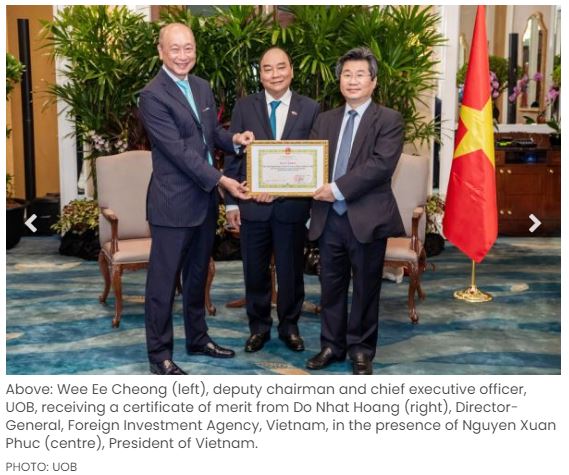Investment interest in Vietnam still high
VIETNAM has been a bit of a darling of Asean in recent years. Between favourable fundamentals such as a young and large population and competitive labour costs, the country has been one of the main benefactors from tensions between US and China, with many manufacturers turning to Vietnam as an alternative to China or as part of a China plus one strategy.
More recently, “decisive containment measures and well-targeted government support” as defined by the International Monetary Fund in its country focus during the early years of the pandemic helped limit economic fallout from the pandemic.
Pre-Covid, Vietnam’s real gross domestic product (GDP) grew 7.02 per cent. A year later in 2020, this dropped to 2.91 per cent; despite this significant fall, it was still one of the highest growth rates in the world. In 2021, GDP further slowed to 2.58 per cent in the face of prolonged movement curbs and a sharp decline in consumer spending.
This year, Vietnam’s government has forecast GDP growth of 6 to 6.5 per cent.
Investment magnet
According to the Singapore Business Federation’s (SBF) National Business Survey which was conducted from July to October last year, Singapore businesses remain keen on Vietnam.
Vietnam came in second in terms of countries Singapore businesses were most keen to venture into. Of the 440 companies who said they are planning for future expansion, 31 per cent said they were keen to go to Vietnam, compared with 34 per cent who wanted to venture into China.
Tied at third place were Malaysia and Indonesia (30 per cent respectively).
Indeed, Singapore has been the top investor in Vietnam for the last 2 years.
In 2021, Singapore pumped US$10.7 billion into the country, accounting for 34.4 per cent of total investment capital in Vietnam. This is up 19 per cent from the 2020 figure when the city-state pumped in US$8.99 billion according to Vietnam’s Ministry of Planning and Investment.
Significantly, there was no dip in terms of overall realised foreign direct investment (FDI). In 2018, realised FDI was US$19 billion. From 2019 to 2021, realised FDI was US$20 billion each year.
“We can think of this as residual FDI that has been pledged prior to Covid. But what is encouraging and exciting is that despite Covid, investors were still confident and they still continued to pump money into the country,” said chief executive officer of UOB Vietnam, Harry Loh.
Meanwhile, registered FDI did take a hit. In 2018, registered FDI was US$35 billion before it climbed to US$38 billion in 2019. 2020 saw registered FDI dive to US$29 billion before climbing up to US$31 billion in 2021.
Loh noted that the drop is “understandable because of travel restrictions”. Also worth noting, he said, is that the figure climbed back up to US$31 billion the following year.
“From this slight increase, we can deduce there’s still very keen interest from foreign investors,” he said.
“I think foreign investors will be more confident (moving forward) because a lot of businessmen think of Covid as a period of baptism – whoever can survive it is stronger and partnerships are worth exploring further.”
Rebuilding from Covid
On Friday (Feb 25), Vietnam President Nguyen Xuan Phuc attended a roundtable for about 100 government officials and business leaders from Singapore and Vietnam as part of his state visit to Singapore.
Notably, President Phuc’s visit is the first state visit Singapore received since the start of the pandemic in early 2020.
During the dialogue, participants discussed new and emerging opportunities for collaboration between Singapore and Vietnamese companies, including digitalisation, infrastructure and sustainability.
SBF and UOB were both recognised by Vietnam’s Ministry of Planning and Investment with a Certificate of Merit for their efforts to promote FDI into Vietnam.
Since November 2019, SBF’s GlobalConnect@SBF programme has facilitated 20 projects in Vietnam; close to 200 Singapore companies have benefited from their advisory support.
UOB meanwhile, has, since signing an expanded Memorandum of Understanding with Vietnam’s Foreign Investment Agency in November 2020, helped more than 60 companies to invest in Vietnam.
Their commitments totalled S$1.6 billion. The companies are from Singapore, Malaysia and China and they are in sectors such as consumer goods, industrials as well as construction and infrastructure.
UOB is also set to facilitate S$3 billion worth of potential investments in sectors such as manufacturing, technology and consumer goods in the next 2 to 3 years.
Meanwhile, Vietnam is actively looking to resuscitate its battered tourism sector with plans to fully reopen the country to foreign visitors. The lifting of nearly all travel restrictions from Mar 15 will create a lot of positive spin-off, said Loh.
According to data from Statista, the country had one of the highest numbers of international tourist arrivals in the Asia-Pacific region in 2019, with yearly increase in tourism receipts before 2020.
“This will create a lot of positive sentiment with businesses … This resumption will also propel domestic consumerism in the country and the spin-off effect will be very positive.”
Source: https://www.businesstimes.com.sg/asean-business/investment-interest-in-vietnam-still-high


 Thailand
Thailand




